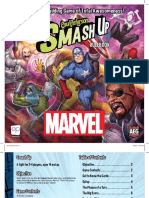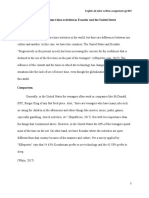0 ratings0% found this document useful (0 votes)
56 viewsWarhammer Fantasy Roleplay - Copia-25
Warhammer Fantasy Roleplay - Copia-25
Uploaded by
Gino BramieriThis document provides guidance on character creation and maintaining a character sheet in a roleplaying game. It includes an example of a filled-out character sheet showing stats and advancement. It offers tips for keeping character sheets updated in pencil, making backups, sharing sheets with GMs, and using an additional page for spellcasters to track spells.
Copyright:
© All Rights Reserved
Available Formats
Download as PDF, TXT or read online from Scribd
Warhammer Fantasy Roleplay - Copia-25
Warhammer Fantasy Roleplay - Copia-25
Uploaded by
Gino Bramieri0 ratings0% found this document useful (0 votes)
56 views1 pageThis document provides guidance on character creation and maintaining a character sheet in a roleplaying game. It includes an example of a filled-out character sheet showing stats and advancement. It offers tips for keeping character sheets updated in pencil, making backups, sharing sheets with GMs, and using an additional page for spellcasters to track spells.
Original Title
Warhammer Fantasy Roleplay - Copia-25
Copyright
© © All Rights Reserved
Available Formats
PDF, TXT or read online from Scribd
Share this document
Did you find this document useful?
Is this content inappropriate?
This document provides guidance on character creation and maintaining a character sheet in a roleplaying game. It includes an example of a filled-out character sheet showing stats and advancement. It offers tips for keeping character sheets updated in pencil, making backups, sharing sheets with GMs, and using an additional page for spellcasters to track spells.
Copyright:
© All Rights Reserved
Available Formats
Download as PDF, TXT or read online from Scribd
Download as pdf or txt
0 ratings0% found this document useful (0 votes)
56 views1 pageWarhammer Fantasy Roleplay - Copia-25
Warhammer Fantasy Roleplay - Copia-25
Uploaded by
Gino BramieriThis document provides guidance on character creation and maintaining a character sheet in a roleplaying game. It includes an example of a filled-out character sheet showing stats and advancement. It offers tips for keeping character sheets updated in pencil, making backups, sharing sheets with GMs, and using an additional page for spellcasters to track spells.
Copyright:
© All Rights Reserved
Available Formats
Download as PDF, TXT or read online from Scribd
Download as pdf or txt
You are on page 1of 1
Chapter II: Character Creation
— sample CharaCTer sheeT —
Here’s an example of a filled in character sheet, using
Nicole’s Elf Outlaw. Note the way her free advance
(+1 to her Attacks Characteristic) is denoted with
a checkmark. When she gets another 100 xp, she
could spend that to increase her WS, BS, Ag, or Int
by 5% or her Wounds by 1. She could not increase
her Attacks again, because she’s already taken that
advance.
As a player, your character sheet is your most
important possession. Here are some tips for its
upkeep:
• Always write in pencil. Characteristics,
Advance Schemes, Trappings, Skills, Talents,
and just about everything else are subject to
change, so don’t use pen or markers on your
character sheet. Nice, erasable pencil is the
way to go.
• Make a backup. Every few sessions, make a
photocopy of your sheet or copy over a new
one. If you don’t, one soda or pizza accident
could spell the end of your character, Fate
Points or no.
• Share with your GM. Let your GM see your
sheet from time to time. It’s good for the
GM to keep up to date with your character’s
abilities and advances.
• Grab a grimoire for spells. There’s an
optional third page to the character sheet
that’s just for spellcasters. If you are playing a
Priest or Wizard, you’ll want a copy of that to
record details of your spells.
23
You might also like
- DDAL07-01 A City On The Edge (5e) PDFDocument50 pagesDDAL07-01 A City On The Edge (5e) PDFjaguarpat9402100% (2)
- VTM V5 Character Creation GuideDocument3 pagesVTM V5 Character Creation GuideYamuna Sivanesan100% (1)
- Middenheim City of ChaosDocument97 pagesMiddenheim City of ChaosGino Bramieri100% (7)
- Mouse Guard 2nd Edition 5Document2 pagesMouse Guard 2nd Edition 5tawo0% (1)
- CCC-SRCC01-01-Trouble in The Old City v15Document35 pagesCCC-SRCC01-01-Trouble in The Old City v15daniel edwardsNo ratings yet
- Embers of Elmwood: Adventure Code: DDEX2-2Document29 pagesEmbers of Elmwood: Adventure Code: DDEX2-2TonyNo ratings yet
- Seafarers RV Rules 111105 PDFDocument32 pagesSeafarers RV Rules 111105 PDFCatalin SavinNo ratings yet
- Dodgeball Tournament Sign Up SheetDocument2 pagesDodgeball Tournament Sign Up SheetTrina CaseyNo ratings yet
- Math MagicDocument144 pagesMath Magicpass100% (11)
- Anima Prime Resurgence A02Document35 pagesAnima Prime Resurgence A02Elder CunhaNo ratings yet
- CP gr5 Analyze Char Teacher Lesson PlanDocument5 pagesCP gr5 Analyze Char Teacher Lesson Planlindsay191111No ratings yet
- Mint and Minotaur - A4Document1 pageMint and Minotaur - A4aditya_taNo ratings yet
- C.Talents 1Document60 pagesC.Talents 1Oto Dzneladze67% (3)
- Creative Writing: Conceptualize A Character/setting/plot For A One-Act PlayDocument11 pagesCreative Writing: Conceptualize A Character/setting/plot For A One-Act PlayKrisha Araujo100% (1)
- FU Beta December 2019Document137 pagesFU Beta December 2019JánosBékési100% (1)
- Minimald6 Lifepath: Game MasterDocument1 pageMinimald6 Lifepath: Game MasterRavenCrowNo ratings yet
- KS Kill - Sector - Crash - Course - Updated - 2.1.21Document2 pagesKS Kill - Sector - Crash - Course - Updated - 2.1.21NathanNo ratings yet
- D&D Adventurers League Pack The Wild Beyond The Witchlight p34Document1 pageD&D Adventurers League Pack The Wild Beyond The Witchlight p34Rafael MenezesNo ratings yet
- Dragonbane Player Creation BookletDocument60 pagesDragonbane Player Creation Bookletdemonguy100% (3)
- Keystone 1 Dungeon v0.1.4Document35 pagesKeystone 1 Dungeon v0.1.4eyi60205No ratings yet
- Paw Patrol at Home Ecape Room A Marshalls and Rubbles Hideout v2 VLDocument23 pagesPaw Patrol at Home Ecape Room A Marshalls and Rubbles Hideout v2 VLJohn Ambrose MaclarenNo ratings yet
- BibliocalypseDocument2 pagesBibliocalypseDiego CapNo ratings yet
- 5e Trait System - GM BinderDocument8 pages5e Trait System - GM BinderAquila12No ratings yet
- Buffy The Vampire Slayer - Quick StartDocument30 pagesBuffy The Vampire Slayer - Quick StartRavenCrow100% (1)
- SampleDocument6 pagesSamplecharliebauer43No ratings yet
- Foil FolioDocument18 pagesFoil FolioNathan GandyNo ratings yet
- qps3 The Sylverian Job 20220203Document13 pagesqps3 The Sylverian Job 20220203jayjay37No ratings yet
- ETERN4Document11 pagesETERN4Jennifer NavarroNo ratings yet
- Defina Skill Element Tier List - Elemental Tier ListDocument4 pagesDefina Skill Element Tier List - Elemental Tier ListMeta HopeNo ratings yet
- SampleDocument4 pagesSampleWilliam Lostkith BlyNo ratings yet
- Savage Worlds Fantasy Character Generator ToolkitDocument85 pagesSavage Worlds Fantasy Character Generator ToolkitRobert Clark80% (5)
- The Spire of The Hunting Sound: Pregenerated Characters and Mini-BestiaryDocument17 pagesThe Spire of The Hunting Sound: Pregenerated Characters and Mini-BestiarykNo ratings yet
- PSRPG YawningGuide - v1 PDFDocument108 pagesPSRPG YawningGuide - v1 PDFbenabhi100% (7)
- Character Archetypes - 14 That Matter For Writing (+ Tips)Document15 pagesCharacter Archetypes - 14 That Matter For Writing (+ Tips)David DNo ratings yet
- Blades in The Dark - Quickstart v4Document52 pagesBlades in The Dark - Quickstart v4triad3204No ratings yet
- Blades in The DarkDocument56 pagesBlades in The DarkConor O'neill71% (7)
- DDEX1 11 Dark Pyramid of Sorcerer's Isle (5e)Document49 pagesDDEX1 11 Dark Pyramid of Sorcerer's Isle (5e)Jean PaquetteNo ratings yet
- REF2 - Player Character SheetsDocument14 pagesREF2 - Player Character SheetsJarad KendrickNo ratings yet
- More Descriptors 1 NumeneraDocument33 pagesMore Descriptors 1 NumeneraJuh FreitasNo ratings yet
- Stats Et BackgroundDocument22 pagesStats Et BackgroundVincent AracwoNo ratings yet
- Clean-Up Crew LandscapeDocument79 pagesClean-Up Crew LandscapeLuan FerreiraNo ratings yet
- Persona TTRPG Character Creation and PlaybooksDocument67 pagesPersona TTRPG Character Creation and PlaybooksQueeeenNo ratings yet
- SampleDocument5 pagesSampleglennkenobiNo ratings yet
- MicroFATE - EngDocument2 pagesMicroFATE - EngClement HoadleyNo ratings yet
- Bugs of VenusDocument12 pagesBugs of VenusDavid KorabellNo ratings yet
- Marvel Smash Up RulesDocument16 pagesMarvel Smash Up Rulesmerli ansaldiNo ratings yet
- 1 © Watts Atelier of The Arts, LLC, 2019Document11 pages1 © Watts Atelier of The Arts, LLC, 2019FeccNo ratings yet
- Gauntlet EscapingBansuninDocument7 pagesGauntlet EscapingBansuninura9qo4yNo ratings yet
- LISADocument33 pagesLISArsdhfgngfNo ratings yet
- The Spire of The Hunting Sound Characters and Mini Bestiary 2017-06-02 5c4b4020402a6Document17 pagesThe Spire of The Hunting Sound Characters and Mini Bestiary 2017-06-02 5c4b4020402a6colin74caNo ratings yet
- qps2 Fabulous 20220203Document23 pagesqps2 Fabulous 20220203jayjay37No ratings yet
- Daring Comics - Training RoomDocument58 pagesDaring Comics - Training RoomLeonard GilesNo ratings yet
- How To Build Your CharacterDocument5 pagesHow To Build Your CharacterJohanna SparkNo ratings yet
- More Descriptors 2 NumeneraDocument23 pagesMore Descriptors 2 NumeneraJuh FreitasNo ratings yet
- qps0 How Robo Santa Stole Christmas No Rules 20220203Document16 pagesqps0 How Robo Santa Stole Christmas No Rules 20220203jayjay37No ratings yet
- BarnacleDocument4 pagesBarnacleJamie SmithNo ratings yet
- WOIN - NOW - Action CareersDocument71 pagesWOIN - NOW - Action CareersMike Mitchell100% (1)
- YawningPortalPrintFriend1Document103 pagesYawningPortalPrintFriend1harrisonwebb26No ratings yet
- Cypher ShortsDocument9 pagesCypher ShortsJason Locher100% (4)
- 5 0 Ez41Document28 pages5 0 Ez41Chris PetekNo ratings yet
- Carnevale FAQ v1.1Document4 pagesCarnevale FAQ v1.1mightynigelNo ratings yet
- DND 6Document2 pagesDND 6sevvalaleyna1970No ratings yet
- Warhammer Fantasy Roleplay - Copia-31Document1 pageWarhammer Fantasy Roleplay - Copia-31Gino BramieriNo ratings yet
- T 2-16: e B T 2-17: H B: Chapter II: Character CreationDocument1 pageT 2-16: e B T 2-17: H B: Chapter II: Character CreationGino BramieriNo ratings yet
- Warhammer Fantasy Roleplay - Copia-27Document1 pageWarhammer Fantasy Roleplay - Copia-27Gino BramieriNo ratings yet
- Warhammer Fantasy Roleplay - Copia-29Document1 pageWarhammer Fantasy Roleplay - Copia-29Gino BramieriNo ratings yet
- Warhammer Fantasy Roleplay - Copia-24Document1 pageWarhammer Fantasy Roleplay - Copia-24Gino BramieriNo ratings yet
- Warhammer Fantasy Roleplay - Copia-26Document1 pageWarhammer Fantasy Roleplay - Copia-26Gino BramieriNo ratings yet
- Warhammer Fantasy Roleplay - Copia-21Document1 pageWarhammer Fantasy Roleplay - Copia-21Gino BramieriNo ratings yet
- Enemy Within Campaign Volume 2 Death On The ReikDocument127 pagesEnemy Within Campaign Volume 2 Death On The ReikGino Bramieri100% (5)
- Enemy Within Campaign Volume 3 Power Behind The ThroneDocument129 pagesEnemy Within Campaign Volume 3 Power Behind The ThroneGino Bramieri100% (2)
- Fast Character - D&D Character Maker - Aasimar Cleric 5 (Domain of Light) - Father TedDocument4 pagesFast Character - D&D Character Maker - Aasimar Cleric 5 (Domain of Light) - Father TedUgo MorelliNo ratings yet
- Solipsism Oracle PDFDocument8 pagesSolipsism Oracle PDFLuke CarlsonNo ratings yet
- Quantitative Aptitude: ProbabilityDocument5 pagesQuantitative Aptitude: Probabilitysj singhNo ratings yet
- MYZ ElyseumDocument124 pagesMYZ ElyseumArturo LopezNo ratings yet
- Godrej Vrikshya OPPDocument19 pagesGodrej Vrikshya OPPDhruv DubeyNo ratings yet
- Global Attractions Attendance ReportDocument46 pagesGlobal Attractions Attendance ReportDinesh Kumar GattuNo ratings yet
- Game Theory & Olipoly PDFDocument19 pagesGame Theory & Olipoly PDFAbid HossainNo ratings yet
- Dungeons Dice and Danger - Solo AIDocument1 pageDungeons Dice and Danger - Solo AIkirules0324No ratings yet
- Trekking In: NepalDocument18 pagesTrekking In: NepalManga kikoNo ratings yet
- Decipher's Wars CCG - 0 Comprehensive Rules v1.5Document11 pagesDecipher's Wars CCG - 0 Comprehensive Rules v1.5mrtibbles100% (1)
- Club House, Jodhpur: Ground Floor PlanDocument1 pageClub House, Jodhpur: Ground Floor PlanHarshita BhanawatNo ratings yet
- Gladiator Class (Free Trial Version)Document8 pagesGladiator Class (Free Trial Version)Daniel PayarNo ratings yet
- What Is Laro NG LahiDocument3 pagesWhat Is Laro NG LahiMichiiee Batalla100% (4)
- Sly Flourish's Guide To To Narrative - Theater of The Mind - Combat in The 5th Edition of Dungeons & DragonsDocument1 pageSly Flourish's Guide To To Narrative - Theater of The Mind - Combat in The 5th Edition of Dungeons & Dragonsshigeaki0% (2)
- Dungeonbowl: Team CreationDocument13 pagesDungeonbowl: Team CreationСаша kH9zNo ratings yet
- Teenagers' Leisure Time Activities in Ecuador and The United States DescriptionDocument3 pagesTeenagers' Leisure Time Activities in Ecuador and The United States DescriptionAriel CantosNo ratings yet
- Volleyball District MeetDocument3 pagesVolleyball District MeetJolah Samaniego BarredoNo ratings yet
- Activity 2.1 Tour and Travel Management: College of Hospitality & Tourism ManagementDocument7 pagesActivity 2.1 Tour and Travel Management: College of Hospitality & Tourism ManagementKyla PalerNo ratings yet
- TravelogueDocument1 pageTravelogueRegina Bona100% (1)
- Exhume2.2b ENG A5 PDFDocument1 pageExhume2.2b ENG A5 PDFikerk1hanNo ratings yet
- Excellence Punta Cana Resort MapDocument1 pageExcellence Punta Cana Resort MapMaríaFernandaGarcíaNo ratings yet
- Brooklyn Chess Chronicle, Vol. 4 (1886)Document205 pagesBrooklyn Chess Chronicle, Vol. 4 (1886)André AmaralNo ratings yet
- Deep Water Chapter 3 Class 12 2023Document15 pagesDeep Water Chapter 3 Class 12 2023sxxgmgzspcNo ratings yet
- La Era de Conan ReglasDocument32 pagesLa Era de Conan ReglasEl MariscalNo ratings yet
- More 5E Feats and Other Options:: Attack RollDocument5 pagesMore 5E Feats and Other Options:: Attack RollyemethNo ratings yet
- CharacterSheet 3Pgs CompleteDocument3 pagesCharacterSheet 3Pgs CompleteRaven VilkasNo ratings yet
- Netball-Lesson-1 2 1Document3 pagesNetball-Lesson-1 2 1api-500494073No ratings yet



































































































